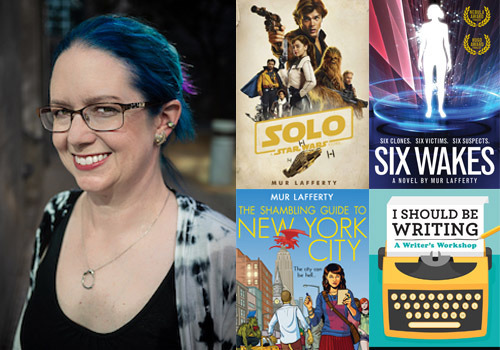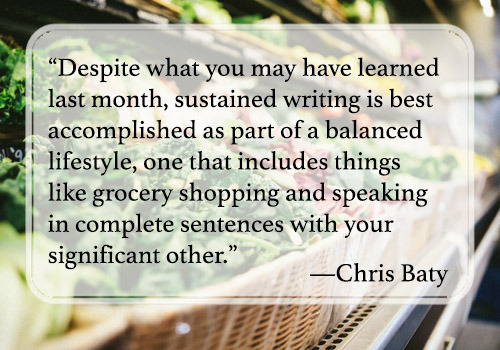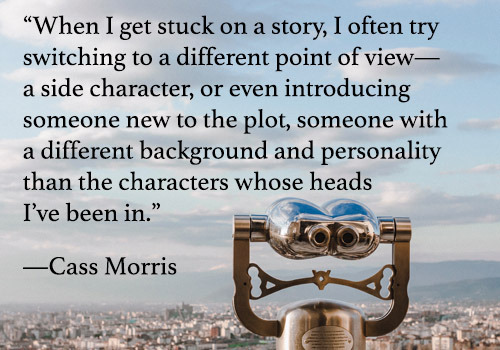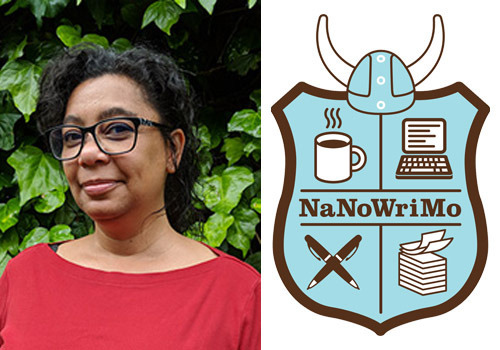Chris Baty's Blog, page 80
May 10, 2019
Did you know that we had over 7,000 classrooms on our Young...

Did you know that we had over 7,000 classrooms on our Young Writers Program in 2017, and sent 2,500 free classroom kits to educators around the world? We’re proud that our programs help support teachers, and we’re happy to celebrate Teacher Appreciation Week this week!
We want to take this opportunity to thank our educators for all their hard work. You make the world a brighter, kinder, and more creative place, and we’re so grateful.
May 8, 2019
Meet NaNoWriMo Writers Board Member Mur Lafferty

Our amazing Writers Board consists of some of our favorite NaNo-novelists. They help connect us with the bigger publishing world, as well as contribute to our programs, initiatives, and writer resources. Today, we’d like to introduce the newest member of our Writers Board, author Mur Lafferty:
Hi there! I’m Mur Lafferty, the newest member of the NaNoWriMo Writers Board. I’m the author of the Hugo- and Nebula- awards nominated book Six Wakes, and more recently am the author of the novelization of the Scribe-Award Nominated Solo: A Star Wars Story. I’m also a podcaster, having given advice and pep talks to new authors since 2004 with my show “I Should Be Writing”. My newer (relatively) show is the Hugo Award winning fancast “Ditch Diggers,” a creative business-focused show with my friend author Matt Wallace.
“The only real writing advice is just write it. As long as you don’t give up, you’re getting better.”Credentials out of the way, I am delighted to be part of this board. I’ve been a big fan of NaNoWriMo for years. Having focused on encouraging beginning writers for so long, I know all too well the slightest roadblock that will cause someone to quit in frustration. A bad workshop, a friend who doesn’t like (insert your genre here), a spouse or parent who believes your time should be spent better elsewhere. Then there’s the writing advice that tells you if you don’t do X, Y, and Z, you’re not a “real author."
NaNoWriMo and I have had the same message: If you’re writing you’re a real author. You may not be published, or making a living, or be widely read. But that comes with practice. And the way you practice is to get as many words as you can down, telling as many stories as you have in you. And you don’t let that jerk in your writer’s group slow you down, and you don’t let your naysaying loved ones slow you down, and you don’t let supposedly-well-meaning pros spouting wisdom that doesn’t apply to you slow you down. Honestly the only person with the authority to slow you down is yourself.
The only real writing advice is just write it. As long as you don’t give up, you’re getting better. And NaNoWriMo’s challenges offer you a chance to take one month out of the year and and focus on this dream you have, write as much as you can, don’t mind how good or bad it is, just write it.
May 6, 2019
How to Build Your Fictional World with Games!

How
does the world of your story work? Today, we’ve based our blog post on a webcast led by founder and Executive Director of The Society of Young Inklings, Naomi Kinsman. Naomi leads improv-based workshops that use a set of quick-thinking and movement games to develop the world of your story, no matter the
genre:
Writing is all about the choices you make along the way. Part of what makes your writing voice unique is the way you choose to tell the story you choose to tell. So, why not play a fun game to help you make those important story choices? You can choose to play these games one of two ways: on your feet or in your seat! The choice is now yours.
Let the games begin!Prompt/Activity #1:The goal here is to make some choices about the world of your story. So, ask yourself: Are your
characters…
relaxed? Creative, or analytical? Generous, or self-focused? Logical,
or emotional? Quick to react, or slow to react? Healthy, or
unhealthy?
What does this information tell you about the world your characters live in?
Prompt/activity #2:Try to physically inhabit your
character! Think about your character: How do they walk? What are
they wearing? Are they holding anything? Do they have an expression
that they wear? Try to find the rhythm of your character’s breath.
Then, imagine your character going somewhere to get food. Where do characters in your world get their
food? An open-air market, a grocery store, or meals on wheels? Or do they have to hunt and forage in order to eat? What would your character want or buy? What would they smell,
hear, or taste?
Visualize your character in an
outdoor space in the world of your story! What does it look/sound
like? What does is smell like? Eucalyptus trees, roses, the ocean? Or does it smell like exhaust from cars passing, a street-side hot dog cart? How does this outdoor space feel to your character?
Then, something in this
space surprises your character!
Go to an urban
area in the world of your story. What’s the architecture like? How
many people are on the street? Is it crowded or are the streets empty? What are people carrying? How do they
interact with each other? How does your character feel in this space?
Then, your character finds something with writing on it in the street! This could be a newspaper, a sign, a magazine, graffiti. What does the text tell us about the world your characters live in?
Prompt/activity #5:Choose a room for your main character to enter. What does the
door look like? What is the largest object in the space? What kind of
tools are in the room? What objects show pop culture? What status
symbols are present or absent? What are the decorations or furniture
like? What objects are available for entertainment purposes?
Draw a map of your world! Go big: use
quick symbols and labels. Where does your character live/sleep? Where do their friends and family live? Are there businesses near by? A market? A park? A sporting arena? A university? A library? Where does the government of your character’s world operate? Is there a jail? A theater? Places of worship? A hospital or medicine woman/man? Which areas are most dangerous and scary for your character? Where does your character feel safest?
Be sure to include on the map any additional locations where incidents/scenes occur in your story.
So many choices, so little time!
Watch the full YouTube webcast with Naomi.
The Society of Young Inklings is a nonprofit organization dedicated to empowering youth writers, ages 8-18. Their programs launched in 2008 in the San Francisco Bay Area. Through their work (and play!) with thousands of students and educators, they developed and refined Writerly Play, a game-based approach to the creative process. The Society of Young Inklings now offers online mentorships, writers’ circles, and courses. Stay in touch by following them on Facebook, Twitter, or Instagram.
Top photo by Hannah Rodrigo on Unsplash.
May 3, 2019
How did April’s Camp NaNoWriMo session go for you?...

How did April’s Camp NaNoWriMo session go for you? Congratulations to all the writers who participated!
If you made a big push to finish a project last month, take a little bit of time to relax, or check out some of our “next step” resources! And if you didn’t reach your writing goal, just remember that, while big challenges can help you accomplish lots of things, sometimes the best thing you can come away with is a sustainable writing routine.
In the words of NaNoWriMo founder Chris Baty: “Despite what you may have learned last month, sustained writing is best accomplished as part of a balanced lifestyle, one that includes things like grocery shopping and speaking in complete sentences with your significant other.”
(From No Plot? No Problem! Revised and Expanded Edition: A Low-stress, High-velocity Guide to Writing a Novel in 30 Days)
Text added over original image by Scott Warman on Unsplash.
May 1, 2019
BRAVE THE PAGE by Rebecca Stern , Grant Faulkner | Kirkus Reviews
We’re excited to release our brand-new writing guide, Brave the Page, later this year! Check out this glowing review from Kirkus.
April 30, 2019
The End Is Near, But The End Is Not The End

It’s the last day of Camp NaNoWriMo this April! Today, Camp participant Curtis C. Chen shares some insight on following the path of a writer and how valuable a writing community can be along the journey:
“Being a writer is like having homework every night for the rest of your life.”
—Lawrence Kasdan, screenwriter of The Big Chill
Good news, Campers! You’ve almost reached the end of April, which means you’re nearing the finish line of this year’s Camp NaNoWriMo journey.
Now the bad news: you will never actually be done with this whole writing thing.
If at any point this month you felt excitement about a particular scene, sentence, or turn of phrase you put down on the page—if you were moved to tears or laughter or exasperation by something one of your characters did, thwarting your original plans for their story—if you felt the fire of creation burning inside you and an irresistible urge to breathe it out in narrative form, well, I’m sorry, but you’re now ruined for anything else.
I’ve dabbled in various creative arts over the years, ranging from playing musical instruments to vocal performance to improv to legitimate theater, and to me, nothing in the world feels as rewarding—or as challenging—as being able to write a story that engages readers at a deep emotional level.
That’s why you’ll always want to write another story. You’ll always want to say more about your protagonist—what happened after this adventure? what did they encounter over the next mountain, around the next corner, through the next wormhole?—or explore a totally different setting with new people and places and conflicts.
But every story will always have the same thing at its heart: the desire to connect with another person through your words.And that never goes away. Having written one work is not the same thing as being a writer. The former is something that anyone can do, with enough time and effort; the latter requires a long-term, almost spiritual dedication. And it’s not for everyone. To paraphrase Lawrence Kasdan above, not everybody wants to do homework every night for the rest of their lives.
But if you think this might be the life for you, if you feel that compulsion to tell stories in any form, you will have to learn to deal with the bad times. When you’re not feeling driven, when life interferes, when the words don’t come easily or don’t come at all. It’s a different struggle for every writer, and navigating it alone can be debilitating.
That’s why it’s so important to have a community, and hopefully you’ve found (or reconnected with) a good group of like-minded folks at Camp NaNoWriMo! These are the people who will help you through the bad times, celebrate with you during the good times, and never give up on you even if you feel like giving up on yourself.
However much progress you made this month on your writing project, remember: the real NaNo was the friends you made along the way.And even if they won’t let you copy their homework (PLAGIARISM IS WRONG DON’T DO IT), you can be study buddies forever after.

Once a Silicon Valley software engineer, Curtis C. Chen (陳致宇) now writes speculative fiction and runs puzzle games near Portland, Oregon. His debut novel Waypoint Kangaroo (a 2017 Locus Awards Finalist) is a science fiction spy thriller about a superpowered secret agent facing his toughest mission yet: vacation. The sequel, Kangaroo Too, lands our hero on the Moon to confront long-buried secrets. Curtis’ short fiction has appeared in Playboy Magazine, Daily Science Fiction, and more. Visit him online: https://curtiscchen.com
Top photo by Kimson Doan on Unsplash.
April 29, 2019
The Marathon of Novel Writing

Camp NaNoWriMo is almost over! Today, Camp Nano participant Linzé Brandon shares some strategies for climbing that final hill on the way to the finish line of your Camp project:
In South Africa, we have an annual ultra-marathon, The Comrades Marathon. The race alternates between starting (and ending) in Durban and ending (and starting) in Pietermaritzburg.
When the race ends in Pietermaritzburg, the last hill before the finish is known as Polly Shortts. Only the professional runners run up this hill. Everyone else walks, or stops frequently. After 80km on the road, this is more than a hill, it is a mountain to tired legs and exhausted minds. This steep hill of about 7km reminds me of the last steps to finishing a novel.
Many writers, like the amateur Comrades runners, fail to reach the finish line because of that last hill. So what does it take to get to the finish line?
This is my strategy to conquer the last hill of novel writing or your Polly Shortts:
I have been a reader for most of my life, but I only started writing in 2001. To be honest, I had no clue what I was doing, but I loved the process of sitting down and writing a story. Although my manuscript was rejected by a traditional publisher, their feedback was encouraging and surprisingly positive.
Twelve years after I wrote my first fictional word, I enrolled in an online creative writing course. And that is where my life as a self-published author got the kick-start I needed. Not all the feedback I received was bubbly, but people loved my stories.
Soon after the course, I published my first novel. Self-publishing can be a minefield. It took me a while to recognize that I finally ran my Polly Shortts. What I didn’t like was how long it took me to get to that finish line. I had to come up with a new plan.
Who are you: the marathon runner or the sprinter?Sprinters are writers who enjoy the thrill, and competitiveness, of word sprints. Sprinters write in short and explosive bursts. Ten or fifteen minutes of focused writing and suddenly three hundred or four hundred words are penned to the page. Do this often enough, and your novel will get finished.
I am the marathon runner. I set myself a daily writing time of two hours. I don’t have a target number of words, but I can write 1000 words per hour, with a break of 15 minutes in the middle—to make a cup of coffee of course.
Small steps lead to big rewards.
I break my project down into smaller chunks: e.g. edit 3 pages today. And sometimes end up doing a whole chapter. Achieving that small goal makes that hill seem not so steep anymore.
Sometimes in life, we have to stop because we need to take a rest, and then we fall behind schedule. When deadlines or the last day of NaNoWriMo are looming, it would be the time to take a deep breath and get ready for Plan B.
With a deadline, you know when you have to be finished, so the target is known. For Camp NaNoWriMo, you can change your goal or do a bit more every day to make up for what has not been completed. For editing, it might be an extra page, or for writing, it may be an additional 500 words.
Every one of us has that last hill to run before we get to the finish line. Even with more than twenty published books to my credit, I still have to face my Polly Shortts every time.
With a plan in place, broken down into smaller more achievable chunks, finishing my next book remains the run up a steep hill, but it no longer feels like an impossible mountain.

In January 2019 Linzé left her full-time job to enjoy the challenges of self-employment. Now she spends her days doing competence training and engineering consulting work. When she isn’t writing, she likes to read, or draw with color pencils, pastels, and ink. She leads the Pretoria Writers Group, of which all the members are published authors. Linzé is married to an engineer and they have three German Shepherd dogs who think the world revolves around them. You can connect with Linzé online: Instagram @linzebrandon; Facebook @LinzeBrandonAuthor; Twitter @LinzeBrandon; Blog: Butterfly on a Broomstick; and find her books on Smashwords.
Top photo by Mārtiņš Zemlickis on Unsplash.
April 26, 2019
Camp Pep: Climb Your Mountain

We’re nearing the finish line of Camp NaNoWriMo this April! Today, Camp Nano participant Rachel Lightfoot offers some wise words on how to catch up if you’re feeling that you’ve fallen behind in your race towards your goal
:
The last week of this Camp session lies ahead, and I’ve yet to write a single word. While others have had an extremely productive month chasing after plot bunnies and letting their characters take them on wild adventures, I’ve been bogged down with the daily grind of coursework and life, getting antsier as the days slip away. And I know I’m not the only one.
I’ve been here many times before, pushing it right to the wire before pulling off a come-from-behind victory. For those of you here with me, I know how each passing day feels—the writer’s Dark Night of the Soul. There’s the anxious panic that you’re running out of time, that you’ll never be able to pull this off. That you were a fool to think you could cut it at this writing thing, so you might as well just give up now before you waste any more time on an impossible pipe dream.
I’m here to tell you, you’re wrong.
Whether you’ve put one single word on paper, or you made it halfway up your mountain before hitting a rut, you are a writer. You’ve chased after a dream, breathed life into characters, and felt called to tell their story. As long as you can still feel the story’s pulse, still feel that aching longing to dig deep and keep trying, you’re doing it right.
“In these last few days, I urge you to give yourself permission to write with reckless abandon.”Everyone’s climb up the writer’s mountain is slightly different. Some trek fast and others slow, but none is better or worse than another.
I have a canvas above my writing desk to help me remember this. It’s a short quote I put together years ago when asked what I needed to hear most: “Foot by foot, word by word, climb your mountain.” Every word matters, even if it’s eventually cut in edits. It gets you closer to the heart of your story, gives you insight into your characters and their motivations. Those are things hard-won and worth celebrating! And this month, this challenge, is your invitation to do just that.
Time might be slipping away, but it’s never too late to start a last-minute charge. Every November, some speedy writers reach 50k the very first day. The magic that drives them onward, and drives the last-minute frenziers, like myself, isn’t limited to any specific date on a calendar. It’s inside us, inside you. It’s the burning desire to keep chasing that dream and drown out any nay-sayers with your characters’ voices. With your voice, your story—that no topsy-turvy life can wrench away from you, not forever.
In these last few days, I urge you to give yourself permission to write with reckless abandon. Embrace every typo, every mistake, no matter how glaring, and see how much you can do when you let go of worry and fear. Each word brings you that much closer to your goal and is a declaration all its own.
You are a writer. You can dream the impossible dream and turn it into reality. But the only way to do it is to put one word in front of the other, time and time again.
So pick up your pen or open your laptop—we both have mountains to climb.

A Missouri native, Rachel C. Lightfoot currently attends medical school at Trinity College in Dublin, Ireland. She first embraced the heady NaNo frenzy in 2008 and hasn’t looked back since. She exclusively writes fantasy, drawing on fae lore to color her worlds, with a hint of “drunk science” thrown in. Her treks up the writer’s mountain have spawned two indie published novels and countless co-written pieces. You can catch her on Twitter or her writing guild’s website.
April 25, 2019
“When I get stuck on a story, I often try switching to a...

“When I get stuck on a story, I often try switching to a different point of view—a side character, or even introducing someone new to the plot, someone with a different background and personality than the characters whose heads I’ve been in.”
—Cass Morris works as a writer and educator in central Virginia, and she occasionally moonlights as a bookseller in the Outer Banks of North Carolina. She completed her Master of Letters at Mary Baldwin University in 2010, and she earned her undergraduate degree, a BA in English with a minor in history, from the College of William and Mary in 2007. She reads voraciously, wears corsets voluntarily, and will beat you at MarioKart. Her debut novel, From Unseen Fire: Book One of the Aven Cycle, is a Roman-flavored historical fantasy released by DAW Books. Follow @CassRMorris on Twitter.
Your Camp Care Package is brought to you by Camp NaNoWriMo. Sign up to receive more Camp Care Packages at campnanowrimo.org.
Text added over original image by Amanda Dalbjörn on Unsplash.
April 24, 2019
Meet Our New Community Manager, Chanda!

Today, we’re delighted to introduce you to our new Community Manager, Chanda Briggs! Chanda will be working with our ML team and Come Write In spaces to expand and deepen our resources and support, in addition to managing our customer service platform and taking pictures for our Instagram. Here’s a short note from Chanda:
Hi everyone! I’m excited to join the NaNoWriMo staff as the new Community Manager. I come to you humbly, with a long history of cafe management and community engagement within diverse communities. I am a proud UCLA alumnus with a major in Cultural Anthropology and a minor in Scandinavian Studies; a current graduate student in Syracuse University’s Library Sciences department; and, much to my surprise, a published author of a poem in a Swedish zine called Finger Pie.
As a NaNoWriMo participant, I understand first-hand what the challenges are for users and I look forward to partnering with volunteers on initiatives, acting as a resource and agent of support (and learning from your experience, as well!), and occasionally having nerdy conversations about coffee and all things Nordic.
Chris Baty's Blog
- Chris Baty's profile
- 63 followers



